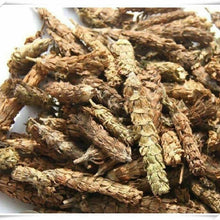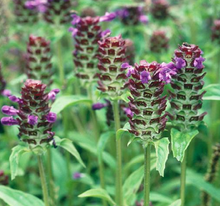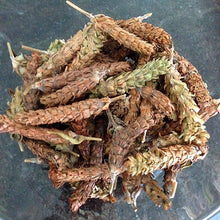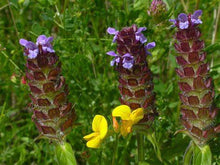Prunella vulgaris is a flowering plant that is also known by the names Common Self-Heal, Xia Ku Cao, All Heal, Woundwort, Heart-of-the-Earth, Blue Curls, and Carpenter’s Herb.
In a study Prunella vulgaris demonstrated that PVE30 is a potent antiviral agent against HSV infection. PVE30 inhibited the attachment of HSV by competing with HS and inactivated virions. In addition, PVE30 effectively restricted viral replication via the inhibition of NF-κB and TLR signalling and prevented HSV-1-induced necroptosis.
The P. vulgaris polysaccharide PVE30 was shown to compete with heparan sulfate for interaction with HSV surface glycoprotein B and gC, thus strongly inhibiting HSV attachment to cells. In addition, PVE30 downregulated the expression of IE genes, which subsequently downregulated the expression of E and L viral gene products, and thus effectively restricted the yield of progeny virus. Further investigation confirmed that PVE30 inhibited TLR2 and TLR3 signalling, leading to the effective suppression of NF-κB activation and IL-6 and TNF-α expression levels, and blocked HSV-1-induced necroptosis by reducing HSV-1-induced phosphorylation of MLKL.
Prunella vulgaris has a long history of as a traditional medicine in the areas where is grows naturally. Ancient Chinese medicinal practices describe the plant as having the ability to change the course of a chronic disease. Prunella vulgaris may also help fight inflammation in your body and thus have the potential to help treat inflammatory diseases. It may reduce the expression of the herpes virus in an in vitro study. It was determined that Prunella vulgaris works by inhibiting viral binding and penetration into the host cells. Additionally, the plant may also help to treat other viruses as well.
Not only does Prunella vulgaris act as an antiviral supplement, but it also may have antibacterial compounds. Aside from herpes, Prunella vulgaris has shown to have an effect on the HIV virus. One study showed that extracts taken from the plant were significantly able to inhibit the replication of the HIV virus in isolated cells with relatively low toxicity, however, the extract did not prevent the infection from occurring at all.
The many polysaccharides may also help prevent the replication of viruses may also have an immune stimulating response that can ward off the spread of harmful bacteria. Based on the production of those antiviral and antibacterial compounds, Prunella vulgaris may prove useful for many conditions including autoimmune diseases, digestive issues, and even cancer. Self-heal can be used internally and externally to help dissolve nodules in the neck (such as goiter), lypomas (fatty tumors) or other nodules involving the lymph. In China, self-heal is used to treat cancer because of its antitumor properties.
Prunella vulgaris acts as both an antiviral and an antibacterial, so its use as an acne treatment. Prunella vulgaris may also prevent the development of estrogen-based cancers. Some research suggests that Prunella vulgaris has an anti-estrogen effect.
Prunella vulgaris has an antihyperglycemic effect. Prunella vulgaris may help reduce blood sugar, benefiting people suffering from diabetes. Prunella vulgaris may also support good dental hygiene, The extract from the plant may reduce inflammation and prevent plaque formation that would cause gingivitis.
Self-heal’s cooling properties help clear liver heat that rises to the eyes and causes swollen, red and painful eyes and headaches. It also can ease tension headaches caused by vertigo, over-sensitivity to light and high blood pressure. Works as a good agent for clearing heat, a refrigerant for fevers, inflammation and simple functional hot conditions in general. Chinese medicine considers the herb particularly effective in toxic heat and Qi level heat. This comprehensive heat-clearing effect is reinforced by a good resolvent detoxicant action that addresses the two main forms of endogenous toxicosis, metabolic and heavy metal toxicosis — with their retinue of often vague and mysterious symptoms.
HOW TO USE:
A dosage of 10-15 mg is advised in supplement, pill, or powder form. If not used in combination with other treatments, dosage should be doubled. One teaspoon of dried herb can be mixed with one cup of boiling water to make an infusion. Tea can also be used as a mouthwash. Fresh cut leaves can be applied to wounds or used as a dressing for smaller nicks, cuts, scrapes, and bruises. Creams are also available to treat topical conditions.








